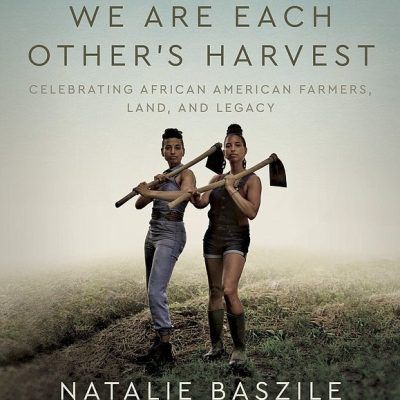Celebrating African American Farmers, Land, and Legacy
By Kosi Agamah
When I first picked up this book I had no clue what I was in store for. In this impressive anthology, Natalie Baszile brings together essays, poems, photographs, quotes, conversations, and first-person stories to examine black people’s connection to the American land from Emancipation to today. Being a Canadian, who is embarking on my way to finding my forever homestead and birthing The Black Pearl Farm this book helps acknowledge where we have come from and encourages me to continue.
Black farming informs crucial aspects of American culture and, if I’m honest, I didn’t see its connection to Canadian culture until I read this book—the family, the way our identity is bound up with the land, the healing power of food, and race relations within Canada.
As a Canadian growing up in Alberta, when I thought about farming I thought about Indigenous peoples and White people. I never saw myself. However, when I would travel home to my mothers home in Guyana I saw Black Farmers everywhere. My mother grew up on a farm. Black people always had a deep connection to the land and I felt a pride because the land was finally calling me home.
We Are Each Other’s Harvest was my welcoming. It elevates the voices and stories of black farmers and people of colour, celebrating their perseverance and resilience, while spotlighting the challenges they continue to face.
A year ago, these conversations, books, conversations on tenant cropping and food sovereignty were not at the forefront. They have exploded into the public consciousness over the past few years, and I can say I am here for it. I celebrate each person’s story and that is exactly what this book offers. It feels like a breath of fresh air and a spotlight that was rightfully earned.
In the 1920s, there were over one million black farmers in North America; today there are just 45,000. I like to say 45,000 and 1 because I now count myself in these numbers. Baszile explores this crisis through the farmers’ personal experiences. In their own words, middle-aged and elderly black farmers explain why they continue to farm despite systemic discrimination and land loss. The book brings to light early images of black farmers and gardeners, and the connection they have to the land in the face of so much struggle. This book offers a sense of inspiration and pride.
In the “Returning Generation,” young farmers are being welcomed home. I cannot sing more praises for this book. When I first decided to farm I couldn’t think of any Black Farmers within Canada. Searching for them was difficult and finding safe spaces to learn and those willing to teach felt almost impossible. Especially for a newly thirty-something-years-young lass.
The doors that this book opens allow the reader to celebrate these holders of knowledge and give us the tools to build upon their legacy. We are offered a chance, through these pages, to connect with ancestors, to read about the challenges they face as they seek to redress issues of food justice, food sovereignty, reparations and land access. This book offered a counternarrative to what the dominant narrative offers of Black farmers. This is not an old story – this is a continuation.
The New Generation is here and unapologetic about holding space and representing hope with the resources we have. Those like Bounty & Full, Sundance Harvest, Luckybug Farms, Shade of Miti, Wayward Farm, Toronto Black Farmers, Happy Acre Farm, and the list goes on, are dreams & prayers fulfilled. They are representation on how land can save, land can encourage, and how farming can build communities and offer healing. A synergy between the young and old, the tech savvy and the not so savvy, across borders and culture lines. Individually we are vulnerable, collectively we have power and we are standing within that power, in the pages of this book.
We Are Each Other’s Harvest is a reminder to weave the untold truth of Black Farmers back into the story and with the allies who welcome, encourage, offer land access, offer help and resources we say THANK YOU.
This book was the true presentation of how it feels to journey home to the land.
⭐⭐⭐⭐⭐ out of ⭐⭐⭐⭐⭐.
Kosi Agamah is the force behind @TheBlackPearlFarm, a new passion project she is growing by playing in the dirt and birthing something spectacular. She believes everything is better when it’s done with the heart and that is why she has taken time to educate herself on the importance of sustainable farming, food justice & security, on what it means to be a new farmer in Ontario and a BIPOC farmer at that. Currently she is in search of her forever homestead, and is growing alongside BlackFarmersTo in Halton, ON.

